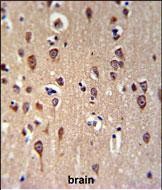GRPR Antibody (Center)
Affinity Purified Rabbit Polyclonal Antibody (Pab)
- SPECIFICATION
- CITATIONS
- PROTOCOLS
- BACKGROUND

Application
| WB, IHC-P, FC, E |
|---|---|
| Primary Accession | P30550 |
| Other Accession | P52500, P21729 |
| Reactivity | Human |
| Predicted | Mouse, Rat |
| Host | Rabbit |
| Clonality | Polyclonal |
| Isotype | Rabbit IgG |
| Calculated MW | 43199 Da |
| Antigen Region | 123-152 aa |
| Gene ID | 2925 |
|---|---|
| Other Names | Gastrin-releasing peptide receptor, GRP-R, GRP-preferring bombesin receptor, GRPR |
| Target/Specificity | This GRPR antibody is generated from rabbits immunized with a KLH conjugated synthetic peptide between 123-152 amino acids from the Central region of human GRPR. |
| Dilution | WB~~1:1000 IHC-P~~1:50~100 FC~~1:10~50 E~~Use at an assay dependent concentration. |
| Format | Purified polyclonal antibody supplied in PBS with 0.09% (W/V) sodium azide. This antibody is purified through a protein A column, followed by peptide affinity purification. |
| Storage | Maintain refrigerated at 2-8°C for up to 2 weeks. For long term storage store at -20°C in small aliquots to prevent freeze-thaw cycles. |
| Precautions | GRPR Antibody (Center) is for research use only and not for use in diagnostic or therapeutic procedures. |
| Name | GRPR |
|---|---|
| Function | Receptor for gastrin-releasing peptide (GRP) (PubMed:1655761). Signals via association with G proteins that activate a phosphatidylinositol-calcium second messenger system, resulting in Akt phosphorylation. Contributes to the regulation of food intake. Contributes to the perception of prurient stimuli and transmission of itch signals in the spinal cord that promote scratching behavior, but does not play a role in the perception of pain. Contributes primarily to nonhistaminergic itch sensation. In one study, shown to act in the amygdala as part of an inhibitory network which inhibits memory specifically related to learned fear (By similarity). In another study, shown to contribute to disinhibition of glutamatergic cells in the auditory cortex via signaling on vasoactive intestinal peptide- expressing cells which leads to enhanced auditory fear memories (By similarity). Contributes to the induction of sighing through signaling in the pre-Botzinger complex, a cluster of several thousand neurons in the ventrolateral medulla responsible for inspiration during respiratory activity (By similarity). |
| Cellular Location | Cell membrane; Multi-pass membrane protein |
| Tissue Location | Highly expressed in pancreas (PubMed:11245983). Also expressed in stomach, adrenal cortex and brain (PubMed:11245983) In brain, expressed in cells throughout the cortex (PubMed:34610277) |

Thousands of laboratories across the world have published research that depended on the performance of antibodies from Abcepta to advance their research. Check out links to articles that cite our products in major peer-reviewed journals, organized by research category.
info@abcepta.com, and receive a free "I Love Antibodies" mug.
Provided below are standard protocols that you may find useful for product applications.
Background
Gastrin-releasing peptide (GRP) regulates numerous functions of the gastrointestinal and central nervous systems, including release of gastrointestinal hormones, smooth muscle cell contraction, and epithelial cell proliferation and is a potent mitogen for neoplastic tissues. The effects of GRP are mediated through the gastrin-releasing peptide receptor. This receptor is a glycosylated, 7-transmembrane G-protein coupled receptor that activates the phospholipase C signaling pathway. The receptor is aberrantly expressed in numerous cancers such as those of the lung, colon, and prostate. An individual with autism and multiple exostoses was found to have a balanced translocation between chromosome 8 and a chromosome X breakpoint located within the gastrin-releasing peptide receptor gene.
References
Guey, L.T., et al. Eur. Urol. 57(2):283-292(2010)
Chapuis, J., et al. Mol. Psychiatry 14(11):1004-1016(2009)
Chao, C., et al. J. Surg. Res. 156(1):26-31(2009)
Ananias, H.J., et al. Prostate 69(10):1101-1108(2009)
Fleischmann, A., et al. Endocr. Relat. Cancer 16(2):623-633(2009)
If you have used an Abcepta product and would like to share how it has performed, please click on the "Submit Review" button and provide the requested information. Our staff will examine and post your review and contact you if needed.
If you have any additional inquiries please email technical services at tech@abcepta.com.













 Foundational characteristics of cancer include proliferation, angiogenesis, migration, evasion of apoptosis, and cellular immortality. Find key markers for these cellular processes and antibodies to detect them.
Foundational characteristics of cancer include proliferation, angiogenesis, migration, evasion of apoptosis, and cellular immortality. Find key markers for these cellular processes and antibodies to detect them. The SUMOplot™ Analysis Program predicts and scores sumoylation sites in your protein. SUMOylation is a post-translational modification involved in various cellular processes, such as nuclear-cytosolic transport, transcriptional regulation, apoptosis, protein stability, response to stress, and progression through the cell cycle.
The SUMOplot™ Analysis Program predicts and scores sumoylation sites in your protein. SUMOylation is a post-translational modification involved in various cellular processes, such as nuclear-cytosolic transport, transcriptional regulation, apoptosis, protein stability, response to stress, and progression through the cell cycle. The Autophagy Receptor Motif Plotter predicts and scores autophagy receptor binding sites in your protein. Identifying proteins connected to this pathway is critical to understanding the role of autophagy in physiological as well as pathological processes such as development, differentiation, neurodegenerative diseases, stress, infection, and cancer.
The Autophagy Receptor Motif Plotter predicts and scores autophagy receptor binding sites in your protein. Identifying proteins connected to this pathway is critical to understanding the role of autophagy in physiological as well as pathological processes such as development, differentiation, neurodegenerative diseases, stress, infection, and cancer.


